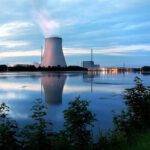Germany will not rely on reserve power from any of the seven nuclear power plants (with a total capacity of about 8,800 MW) that it shut down in the wake of the Fukushima nuclear crisis for this and the following winter, the country’s energy regulator said today.
The Federal Network Agency (Bundesnetzagentur) announced the decision as it presented a report on whether a reserve nuclear plant is necessary, a measure ordained by the country’s new Atomic Energy Reform Act. The act calls for a shutdown of all nuclear reactors in Germany by 2022, but it allows the agency to order back-up operation of one of the eight idled nuclear plants for the next two winter periods to avert danger or interruptions to the security or reliability of power supply. The decision not to use reserve nuclear power came just before the deadline of Sept. 1.
Eight nuclear plants remain offline in Germany—including seven of the nation’s oldest, which were shuttered following the Japan quake in March, and one that is offline due to technical problems. Nine remain operational.
The suspension of the seven oldest reactors has forced Germany—a net exporter of power—to begin power imports from France, raising prices to consumers. Meanwhile, utilities that own nuclear plants around the country, like E.ON and RWE, have threatened legal action against the government’s decision to retain a tax on spent fuel rods to cover costs of their disposal, while grid operators warned that the planned phase-out could result in winter blackouts.
The Federal Network Agency said it had made the decision today “after weighing all the circumstances.” Matthias Kurth, the agency’s president, told reporters that all studies showed that the transmission network would remain “controllable” without the use of a reserve nuclear plant—even in the case of an exceptional contingency. This was possible, he said, because several coal- and gas-fired plants would supply the necessary power.
“We have made sure that power plant 3 in Mannheim (GKM3), power plant 2 in Mainz-Wiesbaden and power plant Ensdorf Block C, facilities that are so important for maintaining voltage in the Rhine-Main-Neckar area, are available in reserve, if need be,” he said.
The 220-MW coal-fired GKM3 is jointly operated by utilities E.ON, RWE, and MVV. The 350-MW gas-fired Mainz-Wiesbaden plant is owned by the government, and the coal-fired Ensdorf belongs to RWE Power.
Kurth said that state governments had agreed to grant the plants necessary emission approvals—as was the case with GKM3 and the state of Baden-Württemberg. “Altogether, we have additional, guaranteed reserve capacity in Germany of 1,009 MW and guaranteed reserve capacity in Austria of 1075 MW,” he said.
“Thus the legislative decision to look into a reserve nuclear plant too has encouraged and accelerated the search for alternatives, and was not fruitless in the least.”
Kurth added that "there will always be risks for security of supply, with or without giving orders for back-up operation. Nobody doubts this. Guarding against every possible risk is impossible, technically and economically.” He said that with Germany’s current levels of knowledge, and with intervention by the country’s transmission system operators, extreme situations would be manageable.
Germany will also give priority on building new transmission, particularly to completing a 380-kV high-voltage line from Hamburg/Krümmel to Schwerin, he said.
"The Bundesnetzagentur’s reports on the impact of exiting nuclear power on the transmission networks show that the networks have reached the limits of their capacity as a result of the large number of additional transport operations in the last few years and the changes in the structure of generation. Grid expansion is therefore urgently required,” Kurth said. “The lawmakers have created the possibility of treading new paths with the network development plans provided for by the Energy Act and the new procedures and optional responsibilities set out in the Grid Expansion Acceleration Act (NABEG). These acceleration mechanisms should be used as soon as possible.”
Sources: POWERnews, POWER, Germany Federal Network Agency










